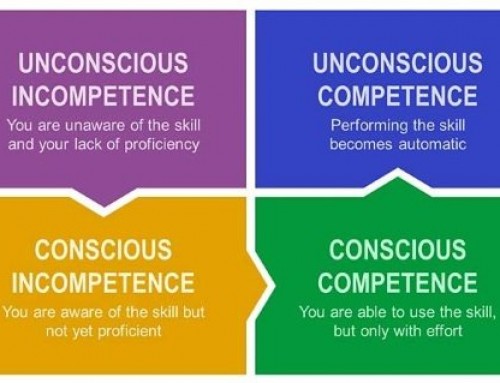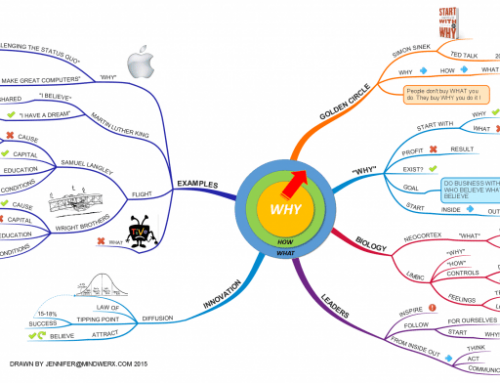In his book Eat That Frog, Brian Tracey says we can Get More of the Important Things Done by ‘eating that frog’ as the one of the first tasks for the day. By that he means do the thing you find most unsavory for the day ahead.
That may be to deal with an dissatisfied customer, address a staff performance issue, give a disappointing sales report to the boss, or complete a task you just don’t want to do. The idea is that once you have done the worst thing that needs to be done (i.e. eaten that unsavory frog) the rest of the day can only get better.
More than that, it won’t be bothering you all day, as it does when you procrastinate, and better still it won’t compound with other distasteful tasks you have to do, which when they mount up can be disempowering and lead to larger performance problems.
Understanding and applying this concept is a valuable success lesson for Reluctant Learners, particularly those undertaking Online Learning.
The Reluctant Learner
In The Buzan Study Skills Handbook, Tony Buzan describes Reluctant Learners as those who keep putting off their study work, which they usually plan to do in the evening. They have urgent tasks that must be done first, they need to make some phone calls, check their social media, reply to emails, and complete their household duties, and then they need something to eat so they have the energy to study.
But while they’re snacking they see a movie they’ve always wanted to watch is on that night, so by the time they are ready to study they’re too tired and ‘brain dead’, so they commit to studying the next day. But of course that doesn’t happen, and within a few days they are so behind in their studies, it is almost impossible to catch-up.
And this applies particularly to Online Study, where there is no class to attend or teacher to prod them, and there can be a sense they can ‘always catch up’ because the material is available 24/7.
But the vast majority of online learners don’t catch up, and a range of sources tell us there are serious levels of non-completion for even high quality online programs, with some programs, such a leading university MOOCs, having non-completion rates as high as 90%.
We’ve even seen employees given access to Compulsory Professional Development (CPD) online courses, that they MUST complete to get a promotion or maintain professional qualifications, and they NEVER even logon. So how can they possibly be gaining the knowledge and skills needed to improve performance and achieve success in whatever they are doing?
This applies to all types of online learning, from online university courses to corporate learning and development programs, and industry specific online courses used by many professional associations and bodies to upskill people in a specific field (e.g. legal and accounting professionals).
So what’s this got to do with the Eat That Frog concept?
Simple really, just make learning or study one of the priorities for your day, make it the frog you’ll eat first. The morning is when your mind is at its freshest, and is the best time for most people to learn. This may mean waking a little bit earlier than normal, which can also be a nice quiet time for you to focus. Make your studies one of the first tasks of the day, before things get away from you.
Years ago as an up and coming executive I followed this pattern. At one stage I had an hour drive to work and would listen to a wide range of personal and professional development programs on cassettes or CDs. Later as a senior executive I usually arrived at work about 7:30, well before the normal 8:30 start time, and I used that time to plan the day, learn more about the people working for me, read about new leadership principles, and much more. It was my time to develop my own knowledge and skills.
I would not open emails, check overnight activities (I ran a 24/7 operation), or start any of my many usual tasks for the day. The first hour of each day was committed to learning how to do my job better, how to improve the way we did things, to look at new advances and trends in our industry and beyond, and to develop the skills I’d need to get the next job I wanted. The result for me was a rapid rise through the organization.
The Path to Success in Online Learning
If you’re doing Online Learning, it is vital to commit to doing some of it each day. With my online MBA students I recommend they commit to an hour each day, which equates to the time a classroom student needs to put in each week – 3 hours in class plus 3 hours external research study and putting new knowledge and skills into practice.
Online learning programs are generally designed in bite sized modules, which makes them perfect for this approach. At the start of the week, map out what you’ll work on each day, and put it into your online calendar, with a reminder alert on when to start it. Be sure to build in time for the suggested exercises, and map out what actions you will take to put your new knowledge and skills into use.
Don’t put your study off, and don’t try to ‘blitz’ it in long study sessions. Slow and steady wins the race. An hour each day is almost always more than enough to get the most from an online program, and when you do that in a disciplined and consistent way, the learning really sticks. I read once that if you study a single subject for an hour each day, within a month you’ll be a local expert, and within a year an international expert. Whether or not that is your aim, the lesson is clear.
And when you complete your study early each day, you’ll have eaten that frog, and the rest of the day will flow better, and you may even be able to put your new knowledge and skills into immediate use. Take it from me, this approach works and will give you the ability to excel.
Leadership’s Role in Successful Online Learning
Most organizations are committed to the professional development of their employees, and some are bound to have their professional staff complete Compulsory Professional Development (CPD) courses. But are those people making the best use of what is on offer, and is the organization getting the improved performance results they want and expect?
Too often the answer is no!
It is not enough for the HR Learning and Development department, or the team manager to make online available to their people. They cannot simply say “you now have access, so complete the course by …’ and then leave people to manage on their own. They must remember, most people who haven’t been in formal study for some time will have become reluctant learners, more concerned about ‘doing their job’ than studying.
So leaders need to take action to ensure their people are not only completing the needed study, but putting it into action, AND that the expected performance gains are being achieved. To do this I suggest:
- At the start of the program explain clearly why the online program is important to the learner’s success or career, to the team’s performance, and to the organization. If relevant discuss what performance improvements are expected following the study.
- Support the learner in setting a viable study plan that will not put excessive pressure on their other duties, and will have them complete the program over an appropriate time period. Be sure they put the plan in their calendar. Are you expecting your learner to do the study in their own time, or is it being built into their work day?
- On a regular basis, check to see how they are progressing, engage in a conversation about what they’re learning, and encourage them to offer any suggestions on how what they’re learning might be put into action to improve the way things are done. Be open to new ideas.
- Be prepared to coach and support them, by being available to discuss any topics or concepts they might be struggling with. Be a mentor as well, remembering what it was like when you were doing the same sort of study to boost your career.
- HR departments and managers should build knowledge and skills improvement, particularly CPD activities, into position descriptions, with KPIs that are discussed on a regular basis. If you want your people to develop their professionalism, build it into the job.
- And lastly leaders should be measuring to see how well the learning is converting into improved performance results. Learning is a vital lead indicator for success, and cannot be left to chance, but you must also be able to see the results at some stage.
In Summary
Someone once said ‘If you think training is expensive, try ignorance’, but what is even worse is when you’re paying for the training and maintaining ignorance because it’s not done properly.
This applies to any type of learning, from on the job skills based training to so-called ‘soft subject’ and leadership programs. But it is particularly the case with Online Learning, which is becoming a major focus for learning and development today.
Reluctant learners aren’t deliberately avoiding their studies; they just don’t see them as a priority compared with doing their jobs. They need to be supported when asked to complete any sort of study, and certainly online study. And they need to understand that eating that frog – that is completing their studies as a priority each day, is a significant key to their success, and vital for the organization.
Bill Jarrard
Mindwerx International
www.mindwerx.com
+61 (0)419 645 299







